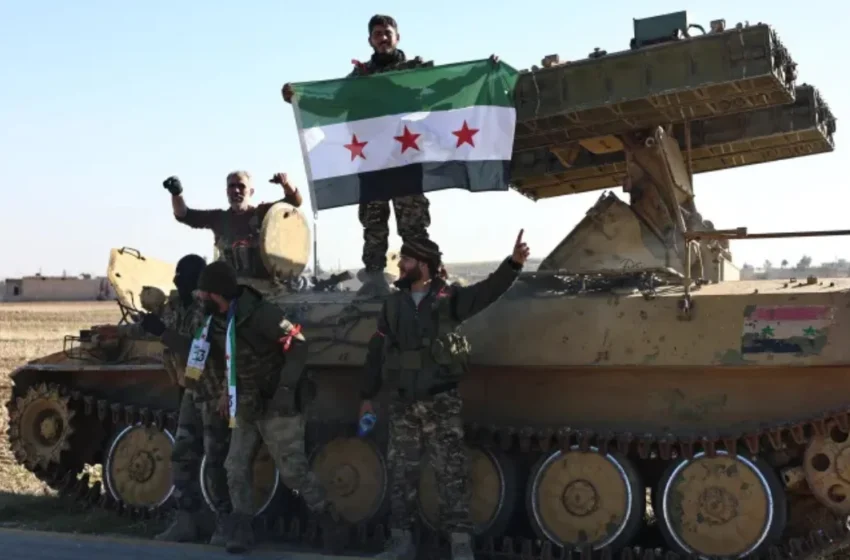
Syria war endangers regional security, says UN envoy
After seizing control of neighboring Aleppo in a lightning onslaught that began last week, rebel factions in northwest Syria believe they are now moving toward the city of Hama. The planned southern march on Sunday marks the fifth day of the unexpected rebel onslaught. Russian and Syrian troops have allegedly been launching airstrikes since Saturday, hammering Aleppo and the opposition-controlled Idlib region. The Syrian state news agency, SANA, reports that government troops led by Syrian President Bashar al-Assad have also been strengthening the northern province of Hama. According to the report, the army drove resistance militants out of the northern countryside overnight. SANA reported that heavy equipment and rocket launchers were being resupplied to the forces there.
Syria fighting risks security
Geir Pedersen, the United Nations’ special envoy to Syria, urged all parties involved in the war to look for a political solution right away.
“The most recent developments have major ramifications for regional and global peace and security, and they pose serious risks to civilians,”
he stated. The conflict is the biggest shift in years for the Syrian war, which started in 2011 with nationwide upheavals. With several rebel factions mostly confined to a limited area of Idlib province, the battle lines have essentially remained at a standstill since 2020. However, government forces withdrew from Aleppo, a strategically important city with a population of over 2 million, on Friday after opposition fighters led by Hayat Tahrir al-Sham (HTS) stormed the city. Since then, the rebels have claimed some strategic successes, including seizing control of Aleppo’s military school, field artillery college, Aleppo Industrial City, and the supply-line town of Khanasir. Previously referred to as al-Nusra Front, the al-Qaeda affiliate in Syria, HTS has separated from the organization and emerged as the most powerful rebel force in northwest Syria.
Syria war threatens the region
Late on Saturday, al-Assad made his first public remarks since the attack began, stating that his troops will keep defending the government’s “stability and territorial integrity against terrorists and their supporters.” No matter how much the rebel groups’ attacks are more intense, Syria can still defeat them, he added. However, opposition fighters were still on the outskirts of Hama and were “trying to counter the Syrian government forces there,” according to reports from the Turkish-Syrian border. Sometimes the Syrian government forces retake the towns and villages that the opposition has captured, she added. Thus, there is an exchange. On the ground, however, it is extremely turbulent and dynamic. The government claimed that weapons stores and rebel strongholds were the targets of the airstrikes on regions under opposition control. But according to the Syrian Observatory for Human Rights, a war monitor based in the United Kingdom, Russian strikes on displaced people’s camps on Sunday killed eight civilians and injured fifty more. The Syrian Civil Defense, often known as the White Helmets, reported that the Syrian government and Russia carried out airstrikes on Sunday that killed at least 25 people, including 10 children.
UN flags Syria conflict risks
With hundreds more people reported displaced in the most recent violence, Syria’s years of conflict have resulted in one of the worst displacement crises in the world. Aleppo is comparatively stable, but many are afraid of how the Russian military and government would react. The battle shifted in favor of al-Assad as a result of Russia’s military engagement in the nation, which began in 2015, and Iran’s two years prior. Then, in 2016, Syrian troops took complete control of Aleppo with the aid of Russian aircraft bombardments.
“We’re talking about rebel groups that are rapidly establishing themselves in Syria, but they also lack air defenses,”
she stated.
“And when we’ve seen this happen Russia and their ally Iran responded with a scorched earth policy against the al-Assad regime.”
Abbas Araghchi, the Iranian foreign minister, was scheduled to visit Damascus on Sunday and assured reporters that Tehran will support al-Assad. In recent talks with al-Assad, Sheikh Mohamed bin Zayed Al Nahyan, the president of the United Arab Emirates, and King Abdullah II of Jordan have voiced their support for him.
Regional stability at risk
However, Saffour said that some Aleppo residents who had endured years of government domination still felt a feeling of anticipation despite the confusion and anxiety. She remarked,
“We’re anxious, but we’re also really excited and hopeful to see what’s going to happen next.”
In 2016, the Syrian army, aided by the Russian air force, retook rebel-held parts of Aleppo, a city known for its iconic citadel. The Syrian government’s soldiers have become the target of a rapid onslaught by an Islamist terrorist coalition.


